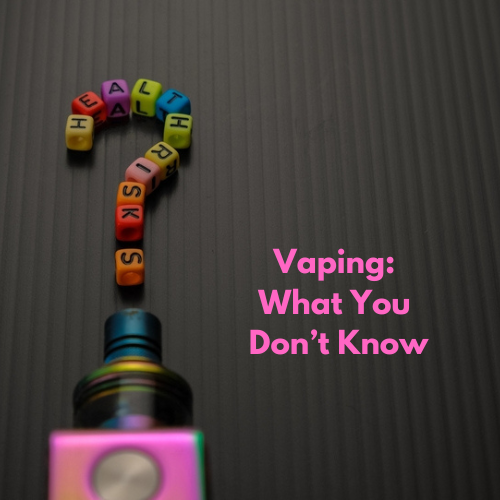While many sources consider vaping slightly less dangerous to health than cigarettes, it all depends on what you are vaping, the concentration of nicotine and the intensity of the voltage of the device. All devices are not the same and all vaping substances are not the same. Knowing what you are getting, the potency and the device itself all factor into how bad it is to vape.
Cigarettes, according to the CDC contain over 7,000 chemicals. Toxic metals found specifically in e-cigarette vapor include: lead, which can damage internal organs; nickel which is associated with lung inflammation and cancer; chromium, which an excess is linked to respiratory issues; mercury, known to damage fertility; chlorine, which causes lung damage; and arsenic, used in poisons and damages internal organs. In addition, harmful organic compounds such as: formaldehyde, a known carcinogen; benzene, found in bug sprays and known to damage DNA; acrolein, used in weed killers and toxic to the heart and lungs; and diacetyl, which is linked to “popcorn lung” – bronchiolitis, are all hazardous elements found in many vape e-liquids. One more area of chemicals are in the flavorings. Many cause inflammation, and permanent damage and scarring in the small airways of the lungs when inhaled. It can also contribute to cardiovascular risk and other respiratory problems. The long term affects may not be known for decades to come (as in the smoking cigarettes timeline).
While most of the use-associated lung injuries and deaths have been attributed to modifying vaping devices, acquiring e-liquids that are from untrustworthy sources, and especially those containing THC, others are still suspect.
The CDC recommends not using THC containing e-cigs or vaping products, buying from trusted, approved sources, and not modifying or adding any substances to a vaping device unless intended by that manufacturer. But the best advice is to quit vaping altogether.
Easier said than done. Managing the emotional reasons, such as stress, social pressure, fear of withdrawal, identity and habit; the physical reasons, such as nicotine withdrawal, hand to mouth habit, appetite change and sensory enjoyment; misconceptions about risks, and lack of alternative coping mechanisms are helpful in stopping vaping. Using acupuncture, mindfulness and meditation, deep breathing exercises, increasing physical activity, and cognitive behavioral therapies in combination can give you the best chance of quitting.
Acupuncture has long been recognized for its impact on addictions, including smoking cessation. It suppresses cravings, reduces stress, aids detoxification, and addresses anxiety associated with the need to smoke. By releasing endorphins, it promotes well-being and eases withdrawal symptoms. A key advantage of acupuncture for quitting smoking is its adaptability to address individual symptoms as they arise during the cessation process.
Employing a range of methods provides the greatest likelihood of successfully breaking this health-draining habit. This comprehensive approach is more effective than relying on a single solution.
Want to hear more from Dr. Carling? Check out our podcast. Search for VitalHealth4You on your favorite podcast listening app or go to vitalhealthcda.com/podcasts/
©2024 Holly A. Carling, O.M.D., L.Ac., Ph.D.







